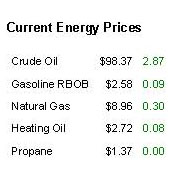Investing in Our Future Energy Crisis?
 (By Keith Kohl) - Whenever I think about how close we are to a world energy crisis, one sobering fact is always on my mind: Fossil fuels make up over 87% of the world’s energy consumption.
(By Keith Kohl) - Whenever I think about how close we are to a world energy crisis, one sobering fact is always on my mind: Fossil fuels make up over 87% of the world’s energy consumption. Think about it for a minute…
If we break that number down, we’re looking at a world where oil is still king:
- Petroleum: 40%
- Coal: 24%
- Natural gas is slightly less, around 23%
I honestly believe most people really have no idea how much 88 million barrels per day is. That’s how much oil the world is projected to consume in 2008.
Then again, oil addiction is something we can’t exactly preach others about. With only about 4.5% of the world’s population, the U.S. makes up roughly a quarter of global oil consumption.
But whether we’d like to admit it or not, fossil fuels are going to remain the dominant source of energy over the next decade. That presents quite a problem, however, considering global oil production is set to peak within the next few years (assuming it hasn’t already). According to the Energy Information Agency (EIA), the world’s oil consumption is expected to increase to over 100 million barrels per day.
Yet it isn’t just more demand we need to make up, but also the decline rates. Naturally, if oil field production didn’t decline, we’d only have to make up another 12 million barrels per day to hit the EIA’s projection. Depending on who you’re talking to, decline rates can vary between 4.5% and 8%.
In other words, we’ll need to add between 3-7 million barrels per day in production just to offset decline. That’s like finding a new Ghawar field every year! Even if Saudi Arabia is able to produce their target of 12 million barrels per day in 2009, I doubt it’ll be enough to make up for the production lost.
A Global Energy Crisis
Over the last few years, it seems that countries are becoming extremely defensive over their natural resources.
Take the fight between Venezuela and ExxonMobil, for example. So what exactly is this quarrel about? After taking the majority stake in several projects in the Orinoco basin, Chavez drew a line in the sand for foreign oil companies like ExxonMobil. By nationalizing those ventures, the companies could either accept the smaller stake or leave.
You can return to the main Market News page, or press the Back button on your browser.

